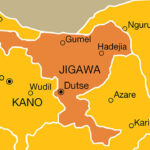
When Kashim Shettima assumed office as governor of Borno State on May 29, 2011, the Boko Haram insurgency was a little over two years old. But Borno and Yobe states had become the theatres of the murderous killings that have no rhyme and no discernible reason – religious or political. We all believed then that the insurgents were a band of ill-equipped army of misguided killers that would sooner than later yield to the superior power of the Nigerian security forces. We were wrong. It did not happen.
Boko Haram is still the greatest security challenge the country has ever known since the rebellion of 1967-70 was crushed. It has more or less now confined its killings and kidnappings to Borno State with occasional murderous raids on parts of Adamawa State. For some six years now, Shettima has had to bear the brunt of the insurgency that has made his state unsafe. Its schools, including the University of Maiduguri, hospitals and markets are not safe. They have all been turned into killing fields. While other state governors waste their state funds on frivolous foreign trips and contracts aimed at oiling the wheels of corruption, Shettima has been held hostage by the security challenges he had the poor luck to inherit.
Almost every week for the past six years, he has had the very unpleasant task of being called to scenes of carnage with scattered body parts everywhere. I think governors also cry. I know of no governor who would view the shredded body parts in market places and motor parks and would not reach for his handkerchief. Add to that the pitiful sight of internally displaced persons; men, women and children without homes and no sources of livelihood and thus clinging to hope as charity cases, and you may have a fair idea of how much Shettima must be enjoying his exalted office.
The Nigerian armed forces now act with a determination to terminate Boko Haram for good. But even if sporadically, the bullets are still whizzing over the heads of the people and the suicide bombers are still blowing up themselves and tens of innocent people with them. What I find most impressive is that in the midst of all these, Shettima has a new, calculated response to Boko Haram. He has embarked on marketing hope in a better tomorrow to his people. It speaks of his courage, his sense of responsibility to his people and his determination that Boko Haram must not be allowed to determine the future of his state and his people. Splendid.
In the past two months or so, Shettima has been advertising his new response to the insurgency in the Daily Trust newspaper. With the hashtag, #RebuildingBorno, Shettima wants to tell his people it is time to look beyond Boko Haram and stop treating it as a permanent fixture in the fate and the future of their state.
His strategy hangs on two important considerations. The first is to reassure his people that the insurgency cannot and would not be allowed to hold the state hostage for much longer. Like all evils wrought by man against man, it must ultimately be forced to yield to the superior moral authority of the good in man – and woman. The second is to impress it on the indigenes of the state that the time has come for them to wake up to the enormous challenges of rebuilding their state. He thus invites them to join him in this critical task by showing them and the Nigerian public at large what he is doing in the task of helping Borno State to rise from the ashes of killings, kidnappings and devastation by Boko Haram. We have not given this man due credit for his courage, his initiative and his fighting spirit. It is unfair.
Here are some of the facts I picked up from his advertisements in the Daily Trust: 132 resettlement houses for Boko Haram victims in Tamsukawu, Maintahururi and Mainok villages in Kagara and Konduga local government areas; 32-classroom mega school (for insurgency orphans at Gomari; 40-classroom mega school (for insurgency orphans) 202 Estate, Maiduguri.
They may, on the face of it, look modest if you measure them against the degree of physical destruction and the emotional trauma visited on the state and its people by the insurgents. But we must appreciate his efforts in the larger context of waking up the people to the simple fact that they, and only they, can help to rebuild their state.
It is more than a pep talk. Shettima is in the business of marketing hope. You cannot lead people without marketing hope to them. Hope is the human compass in the journey to tomorrow. The good book puts it well: without hope, the people perish.
Luckily for Shettima and his initiative, time changes most things. The federal government recognises its role in rebuilding Borno State – and has stepped in, a big brother helping a small brother. But it is worth recalling that in a media interview sometime this year, Shettima said that at the height of the insurgency, he sought for an audience with President Goodluck Jonathan. He flew to Abuja, armed with sordid facts on the insurgency and to impress it on the president that the federal government would be remiss in remaining aloof. To his shock and dismay, Jonathan could spare him only three minutes of his precious presidential time. As far as the former president was concerned, because he was convinced that Boko Haram, was a sinister northern plot to unseat him, the ball was not in his court but in that of the governor. There are presidents and there are presidents.
At a recent meeting with the then acting president, Professor Yemi Osinbajo, Shettima received the good news. In what looks like a local Marshall Plan, the federal government has already initiated a policy for the reconstruction of the state, beginning with the Bama Initiative Scheme in Bama local government area. Under the new policy the federal government would contribute 67 per cent of the reconstruction fund. Borno State will chip in the remaining 33 per cent.
And here is where the initiative would take the state: the construction of 3,000 housing units for internally displaced persons, the construction of intra and intra local government roads, the building of ten police stations, 18 primary and secondary schools and health centres. It would also see to the recruitment of 20 doctors, 100 nurses and the recruitment of teachers to man the new schools.
I am sure Kashim Shettima is smiling. Thank goodness.

 Join Daily Trust WhatsApp Community For Quick Access To News and Happenings Around You.
Join Daily Trust WhatsApp Community For Quick Access To News and Happenings Around You.


